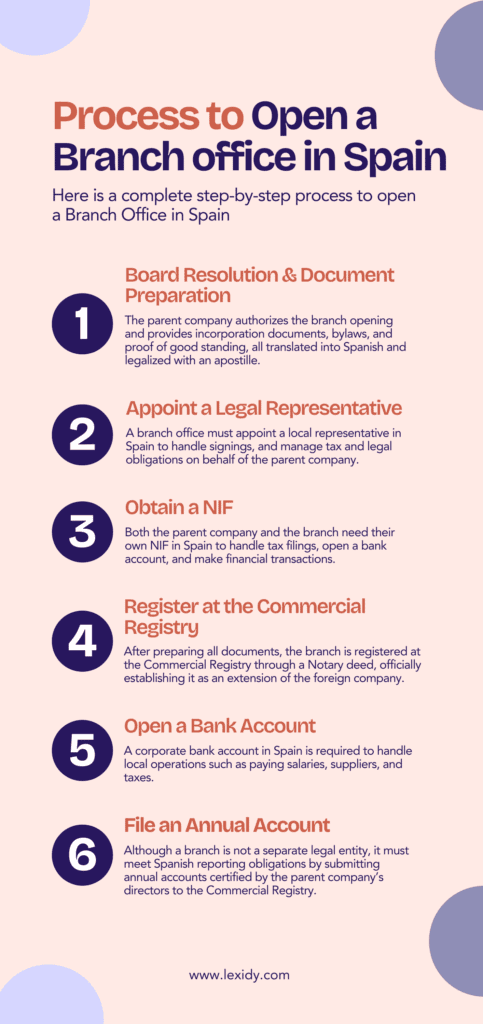Spain has become a strategic hub for international companies looking to expand in Europe. Opening a branch office in Spain allows foreign businesses to establish a direct presence without creating an independent legal entity.
For many organizations, setting up a branch in Spain is the simplest way to access the Spanish market while keeping operations closely linked to the parent company.
This guide explains the full process of opening a branch office in Spain, including legal requirements, registration steps, tax obligations, and practical tips for smooth expansion. Whether you are testing the market or planning long-term growth, understanding the branch setup process is essential to make informed business decisions.
(Article Updated October 2025)
Table of Contents
- What is a Branch Office in Spain & Who Can Open One?
- Branch Office in Spain vs Subsidiary: Key Differences
- Key Requirements to Open a Branch Office in Spain
- Process to Open a Branch Office in Spain
- Advantages of Opening a Branch Office in Spain
- Common Mistakes to Avoid When Opening a Branch in Spain
- Why Lexidy is Your Partner
- Start Your Branch Office in Spain with Confidence
What is a Branch Office in Spain & Who Can Open One?

A branch office in Spain is an extension of a foreign company that operates under the legal identity of its parent business. Unlike a subsidiary, it does not create a new legal entity. Instead, the branch carries out commercial activities in Spain on behalf of the parent company while remaining dependent on it for decision-making and liability.
Key Features of a Branch Office in Spain
- Operates under the same legal personality as the parent company.
- Must be registered with the Spanish Commercial Registry.
- Requires a local legal representative to act on behalf of the parent company.
- Can carry out the same or related activities as the parent company.
Who Can Open a Branch in Spain?
Any foreign company that is legally incorporated in its home country may open a branch office in Spain. This option is particularly popular with:
- Multinational corporations expanding into the Spanish market.
- Medium-sized businesses looking for EU market access without creating a new subsidiary.
- EU companies that want a presence in Spain while maintaining full control from abroad.
Opening a branch office is often the preferred choice when a business wants to test the Spanish market, streamline operations, or manage local clients without establishing an entirely separate company.
Curious about other company structures in Spain? Discover which option best fits your business goals by visiting our Company Formation in Spain page.
Branch Office in Spain vs Subsidiary: Key Differences
When expanding into Spain, one of the first decisions a foreign company must make is whether to establish a branch office in Spain or set up a subsidiary. While both allow you to operate legally, there are important distinctions that affect liability, taxation, and operational flexibility.
| Feature | Branch Office | Subsidiary |
| Legal Status | Not a separate legal entity, operates under the parent company | Local legal entity owned by a foreign parent company |
| Liability | Limited autonomy, decisions controlled by the parent | Liability limited to capital invested in the subsidiary |
| Taxation | Corporate tax in Spain on Spanish-sourced profits | Corporate tax in Spain on worldwide income |
| Administration | Registration at the Commercial Registry and appointment of a local representative | Full compliance with Spanish company law (bylaws, accounts, shareholder requirements) |
| Autonomy | Limited autonomy, decisions controlled by parent | Independent management and decision-making in Spain |
| Access to Incentives | Branches may not be eligible for local subsidies or government grants | Access to certain subsidies and grants often limited to Spanish companies (SLs), which could benefit your activity if you plan to leverage local incentives |
Which is Better?
A branch is often chosen by companies seeking entry into Spain while maintaining centralized control. A subsidiary may be more suitable for businesses planning long-term growth, local investment, or partnerships.
Not sure which route is best for your company? Complete the form below to receive personalized advice from legal experts specializing in branch and subsidiary setups in Spain.
Key Requirements to Open a Branch Office in Spain
To establish a branch office in Spain, foreign companies must comply with several legal and administrative requirements. These ensure the branch operates transparently and in line with Spanish commercial law.
Legal Documents
- Parent Company Documents: You must provide the parent company’s certificate of good standing or company data (with basic information about the company and details on the management body) and bylaws or articles of association. These must be notarized, translated into Spanish by a sworn translator, and apostilled if the country is part of the Hague Convention. If not, they will need to be legalized at the Spanish Consulate or Embassy.
- Board Resolution: The parent company must issue a formal resolution approving the creation of the branch office in Spain and appoint the representative.
Representation
- Local Representative: You must appoint a legal representative (a Spanish resident). This individual can act on behalf of the branch and ensure compliance with tax and legal obligations. Faculties are limited to what is stated in the Board Resolution.
Registration
- Commercial Registry: You must register the branch at the Registro Mercantil (Commercial Registry) corresponding to its Spanish location.
- Spanish Tax Identification Number (NIF): The branch will need its own NIF for tax and operational purposes.
Other Compliance Obligations
- Accounting Records: Branches must maintain accounting books in accordance with Spanish regulations, even though they depend on the parent company.
- Annual Filing: Branch offices must file annual accounts and reports, certified by the parent company’s directors.
- Bank Account: You need a Spanish bank account to handle local transactions, salaries, and tax payments.
Setting up a branch office in Spain involves careful preparation of documents and strict compliance with Spanish administrative rules. Missing paperwork or mistranslations can lead to delays, so many companies choose professional legal support to streamline the process.
Process to Open a Branch Office in Spain

The process of setting up a branch office in Spain involves a series of legal and administrative steps. You must follow each step carefully to ensure the branch is compliant with Spanish regulations.
Step 1: Board Resolution and Document Preparation
The parent company issues a resolution authorizing the opening of the branch. At the same time, you must collect incorporation documents, bylaws, and proof of good standing. These must be translated into Spanish by a sworn translator and legalized with an apostille.
Step 2: Appoint a Legal Representative
A branch office must have at least one representative in Spain. This person will act on behalf of the parent company, sign documents, and manage tax and legal obligations locally.
Step 3: Obtain a Spanish Tax Identification Number (NIF)
The foreign company and the branch need their own NIF to operate in Spain. This is essential for tax filings, opening a bank account, and carrying out any financial transactions.
Step 4: Register at the Commercial Registry
Once all documents are prepared, the branch must be registered at the Registro Mercantil (Commercial Registry) through a Notary deed. The registration officially establishes the branch as a recognized extension of the foreign company.
Step 5: Open a Bank Account
A corporate bank account in Spain is required to handle local operations such as paying salaries, suppliers, and taxes.
Step 6: File Annual Accounts
Even though a branch is not a separate legal entity, it must comply with Spanish reporting obligations. Annual accounts certified by the parent company’s directors must be submitted to the Commercial Registry.
Starting a company in Spain can be complex for foreign entrepreneurs. Having an experienced corporate lawyer in Spain by your side ensures the process runs smoothly and compliantly from day one. Learn more about company formation in Spain.
Advantages of Opening a Branch Office in Spain
Opening a branch in Spain is one of the most effective ways for foreign companies to expand into Europe. It combines strategic advantages with practical benefits that make it a popular choice for international businesses.
Strategic Advantages
- Access to the EU market: A branch in Spain gives your company direct entry into the European Union, simplifying trade and mobility within the Schengen Area.
- Credibility with clients and partners: Operating under the same legal identity as the parent company reassures customers and suppliers of your global backing.
- Market presence without full incorporation: A branch lets you establish a footprint in Spain while maintaining the core structure of your business abroad.
Practical Advantages
- Centralized management: Decisions remain under the parent company, making governance simpler.
- Scalable model: Branches are flexible, allowing businesses to expand services in Spain without replicating their entire corporate structure.
Common Mistakes to Avoid When Opening a Branch in Spain

Even though the process of setting up a branch office in Spain is straightforward, many companies face delays or complications due to avoidable errors. Here are some of the most frequent mistakes:
- Incomplete documentation: Missing apostilles, translations, or legalized parent company documents often cause applications to be rejected or delayed.
- Misunderstanding tax obligations: A branch is not a separate legal entity, so its profits are taxed in Spain under the parent company. Some businesses overlook VAT registration, corporate tax filings, or social security obligations.
- Choosing the wrong structure: Some companies confuse a branch with a subsidiary. This mistake can impact liability, management, and taxation, so it’s crucial to confirm that a branch is the right fit.
- Not appointing a legal representative in Spain: Every branch must have a local representative authorized to act on behalf of the parent company. Forgetting this step can stall the registration process.
- Underestimating bureaucracy: Spanish corporate processes require patience and precision. Skipping professional support often leads to repeated visits to the Commercial Registry or tax office.
Avoiding these mistakes saves time, money, and frustration, and ensures your branch in Spain is up and running smoothly.
Why Lexidy is Your Partner
Opening a branch office in Spain is an exciting step, but it can quickly become overwhelming without the right support. From notarized documents to tax registrations, every step must be precise to avoid setbacks.
That’s where Lexidy’s legal eagles come in. The passionate legal team helps international companies simplify the entire process of establishing a branch in Spain by offering:
- Tailored guidance: Clear, step-by-step support that ensures all legal and tax requirements are met.
- Document preparation and review: Apostilles, sworn translations, and corporate documents handled with care.
- Tax and compliance support: Registering with the Spanish Tax Agency and Social Security to avoid penalties.
- Ongoing assistance: Support doesn’t stop after registration; the team is available for renewals, filings, and expansion needs.
With expert guidance, your branch in Spain can start operating faster and with fewer risks, giving you the confidence to focus on growing your business.
Start Your Branch Office in Spain with Confidence
Spain offers international companies an attractive base to expand into Europe, but setting up a branch requires careful planning and compliance with local regulations. From preparing corporate documents to registering with the Commercial Registry and tax authorities, every step matters.
With the right support, opening a branch in Spain becomes a smooth process instead of a stressful one. The legal experts at Lexidy are here to make sure your expansion is fast, compliant, and hassle-free.
Ready to get started? Fill out the form below, and one of our lawyers will guide you through every step of opening your branch in Spain.

